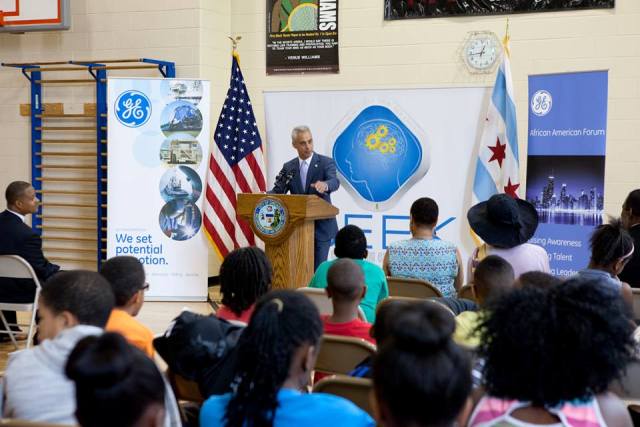Emanuel, McCarthy Address Last Weekend's Violence
By Chuck Sudo in News on Jul 8, 2014 2:00PM

Photo credit: City of Chicago/Brooke Collins
We were waiting to see how Mayor Rahm Emanuel and Chicago Police Superintendent Garry McCarthy would respond to the spate of holiday violence that ultimately left 14 dead and 84 wounded in shootings across Chicago. (The number of wounded alone would be able to fill a single CTA bus.)
Both were visibly frustrated at news conferences addressing the weekend’s shootings. McCarthy was grasping for answers, especially considering there were hundreds of extra police on the streets in high-crime areas throughout the holiday in an effort to curb shootings. McCarthy intimated police had things under control until that 13-hour stretch from Sunday afternoon through early Monday morning where 29 people were wounded and four killed in shootings.
“Yesterday is the day that really blew it up for us,” McCarthy said, omitting the 10 killed and 55 wounded before the shootings intensified Sunday. McCarthy said having all those extra cops on the streets and still seeing these high numbers was “unacceptable” and turned attention back to lobbying for tougher gun laws and punishments for people who buy guns for criminals and people who illegally own guns.
“There’s a greater sanction from the gang members who lose that firearm from their gang than there is to go to jail for possession of that gun,” McCarthy said.
Emanuel joined McCarthy in calling for tougher gun laws and added having extra police on the streets wasn’t enough.
“Where are the parents? Where is the community? Where are the gun laws? Where are the national leaders, so we don’t have the guns of Cook County, Indiana and downstate Illinois flowing into the city?"
We understand the mayor is frustrated but when he says things like this, it implies the neighborhoods ravaged by gun violence have neither solid parenting nor a community structure to combat it. And this isn’t the first time Emanuel has intimated this belief.
As Daniel Kay Hertz writes, the reality isn’t so cut and dried:
This slur - that violence could be prevented by the people who live in the neighborhoods it affects, if only they cared or tried hard enough - needs to end. For one, you only have to walk a few blocks in most of the communities most affected by crime in Chicago to see lots of indications that the people who live there - shock of shocks - are, in fact, “taking a stand” already.
Hertz is talking about the litany of neighborhood block clubs established in order to provide that sense of "community" and structure Emanuel intimates is lacking.
Hertz continues.
But what makes this trope really sublime is the fact that neither mayors, nor police commissioners, nor the most esteemed criminologists, have more than the barest understanding about why crime goes up or down to begin with. Concentrated poverty and unemployment can’t help, of course, but consider that crime continued to fall or remain steady in Chicago and the rest of the country during the worst economy since the Great Depression. So people like Mayor Emanuel, faced with a problem he doesn’t know how to fix, instinctively reach to blame the people who are most brutally affected.Of course, this slur wouldn’t work if we weren’t so eager to believe that people who are poor or non-white - the people who disproportionately suffer from crime - are somehow less civilized, less moral, less interested in their communities, than everyone else. But that’s a lie.
As Scott Smith notes, Emanuel’s words make headlines and when he’s laying part of the blame for the weekend’s violence on the “community” (intentional or no) it reinforces the racist stereotypes some of us have of “those people” and how, while the violence is maddening, it doesn’t affect those of us who live in safer neighborhoods because "we" wouldn't be caught dead in Englewood or Austin anyway. It’s particularly insulting to parents in these communities calling for police to provide a better buffer between their children and street gangs that are a root cause of the violence.
Emanuel’s “where’s the community” rhetoric ignores the ingrained poverty and urban disinvestment in these communities that drives so many young men and women to gangs and lives of crime. And this city is already hyper-segregated enough. If we’re so outraged at the violence, we should become One Chicago and help fight it.